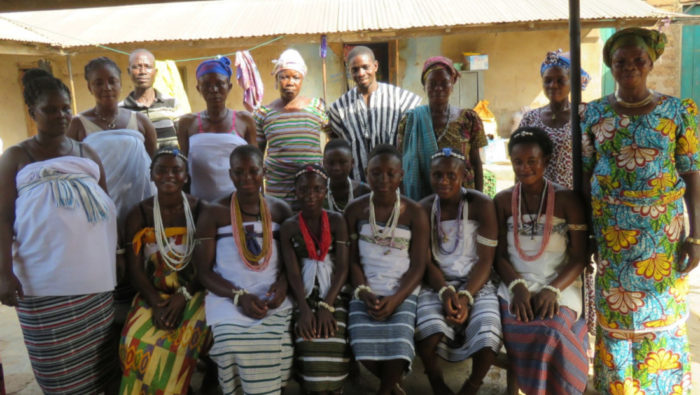
Inwards and Outwards: An Ethnographic Reflection on the Plural Legal System in Rural Ghana from the Perspective of a Ghanaian Scholar

When I began my research exploring legal pluralism in Ghana, I knew the questions I had posed would require methodological approaches that allow for a deep immersion in the debates that shape and reconstruct the conceptual issues. Through this deep immersion, I gained a ‘native’ perspective to understand female traditional leaders known as queen mothers, priestesses, clan heads and cult leaders, their networks, roles, relationships, and interactions. In Ghana, a plural legal system allows state institutions to exist side by side with traditional institutions. While scholars have undertaken several pieces of research on the efficacy of the relationship, networks, and hierarchies of the system, little had been done on the gendered aspect. In this post, I explore the approaches that connect personal and field experiences as a Ghanaian researching plural legal system.
When I started data collection, I understood that the key to exploring the gendered dynamics of legal pluralism required multiple dialogues and discourses between myself (the researcher) and my research participants. For instance, I considered how history, customs, precedents, traditions, and government policies affect and shape the relationship between female traditional leaders, male traditional leaders, state institutions and the public. As a Ghanaian, I was forced to reflect on my experience of growing up in rural Ghana with female traditional leaders. This motivated me to use the techniques of autoethnography to systematically analyse my experience in the field, as well as outside of and before the data collection period. In that way, I moved both inward and outward by reflecting on my interactions with my paternal grandmother called Awo, who was the clan leader in my hometown in central Ghana. My reflection on Awo’s role in resolving clan disputes, taking part in cultural events, and interacting with other clans in this small community built the foundation for ethnographic research that occurred in the field.
In the past, researching legal pluralism had always relied on historical methods like archival and secondary data reviews but I chose ethnographic fieldwork in a small district in the Northern region of Ghana. In the space of 11 months, I took part in the lives of others through observation, recorded events as they occurred, conducted interviews, traced maps, took pictures, and documented cultural performances to explain what I saw and heard. Throughout fieldwork, ethnography became both an approach to data collection and a writing technique. For example, it allowed me to take part in the lives of these female traditional leaders through detailed observations in their homes. As a writing method, I organised my text conceptually to explain how and why socio-cultural events occurred the way they did.
The key lesson throughout my use of ethnography and autoethnography is that observing and documenting events and putting them into context involves building rapport and trust, understanding the ‘native’ perspective, and getting out of one’s comfort zone. For example, I shared my room in the field with others, lived with limited amenities and took part in unfamiliar cultural and social activities. Thus, ethnography and autoethnography require us—researchers—not only to go beyond observation but to make commitments that transcend mere fieldwork.
As I observed these female leaders and reflected on my experience, I was moved toward relating to them and myself. By effectively listening to their narratives, I understood their adaptation mechanisms, elasticity, networks, and relationships that allow these leaders to maintain their status in rural Ghana. Conducting fieldwork, therefore, became as personal as it gets, not only in building and establishing relationships but also shaping my distinctive experiences of the cultures in which I belong.
Ethnography and autoethnography, while becoming invaluable to me as a researcher, can also improve the understanding of female traditional leaders—queen mothers, priestesses, clan heads and cult leaders as strong pivots in the plural legal system in northern Ghana.

